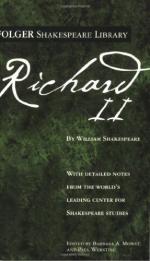|
This section contains 10,614 words (approx. 36 pages at 300 words per page) |

|
SOURCE: “Paradise and Paradise Lost in Richard II,” in Shakespeare Quarterly 37, No. 3, Autumn, 1986, pp. 318-39.
In the following essay, MacKenzie explores the manner in which the language and figures of English mythology and “anti-mythology” are developed into the visions of England as paradise and as an “English paradise lost” in Richard II. MacKenzie observes that while Gaunt refers to England as a mythological and Biblical paradise, the play also refers to England as a “fallen paradise” in Biblical, iconographical, and classical terms.
With his country in the grasp of a king whose manoeuverings have verged on misrule, his son banished and his own life nearing its end, John of Gaunt pays homage to the English realm, describing it as
This other Eden, demi-paradise.
(II.i.42)
Shakespeare's generation appears to have found the word “paradise” particularly evocative. One Elizabethan translator (1583) refers to the Low Countries as “the Paragone, or...
|
This section contains 10,614 words (approx. 36 pages at 300 words per page) |

|


